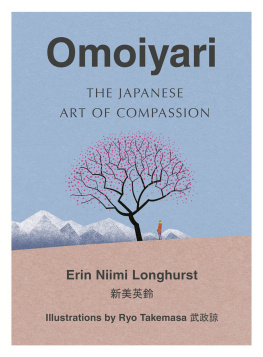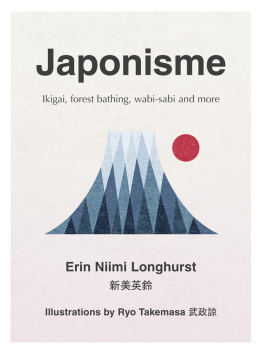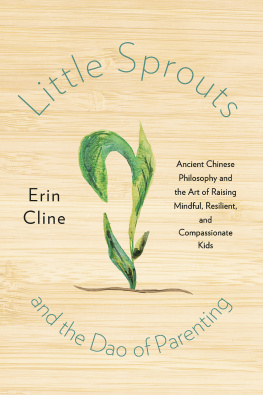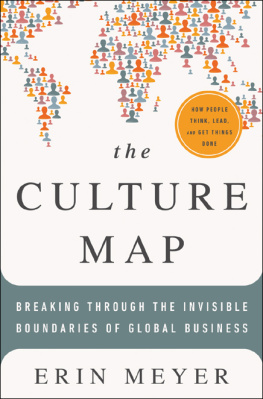Erin Niimi Longhurst - Omoiyari: The Japanese Art of Compassion
Here you can read online Erin Niimi Longhurst - Omoiyari: The Japanese Art of Compassion full text of the book (entire story) in english for free. Download pdf and epub, get meaning, cover and reviews about this ebook. year: 2020, publisher: HarperCollins Publishers, genre: Home and family. Description of the work, (preface) as well as reviews are available. Best literature library LitArk.com created for fans of good reading and offers a wide selection of genres:
Romance novel
Science fiction
Adventure
Detective
Science
History
Home and family
Prose
Art
Politics
Computer
Non-fiction
Religion
Business
Children
Humor
Choose a favorite category and find really read worthwhile books. Enjoy immersion in the world of imagination, feel the emotions of the characters or learn something new for yourself, make an fascinating discovery.
- Book:Omoiyari: The Japanese Art of Compassion
- Author:
- Publisher:HarperCollins Publishers
- Genre:
- Year:2020
- Rating:4 / 5
- Favourites:Add to favourites
- Your mark:
- 80
- 1
- 2
- 3
- 4
- 5
Omoiyari: The Japanese Art of Compassion: summary, description and annotation
We offer to read an annotation, description, summary or preface (depends on what the author of the book "Omoiyari: The Japanese Art of Compassion" wrote himself). If you haven't found the necessary information about the book — write in the comments, we will try to find it.
Omoiyari: The Japanese Art of Compassion — read online for free the complete book (whole text) full work
Below is the text of the book, divided by pages. System saving the place of the last page read, allows you to conveniently read the book "Omoiyari: The Japanese Art of Compassion" online for free, without having to search again every time where you left off. Put a bookmark, and you can go to the page where you finished reading at any time.
Font size:
Interval:
Bookmark:
Contents
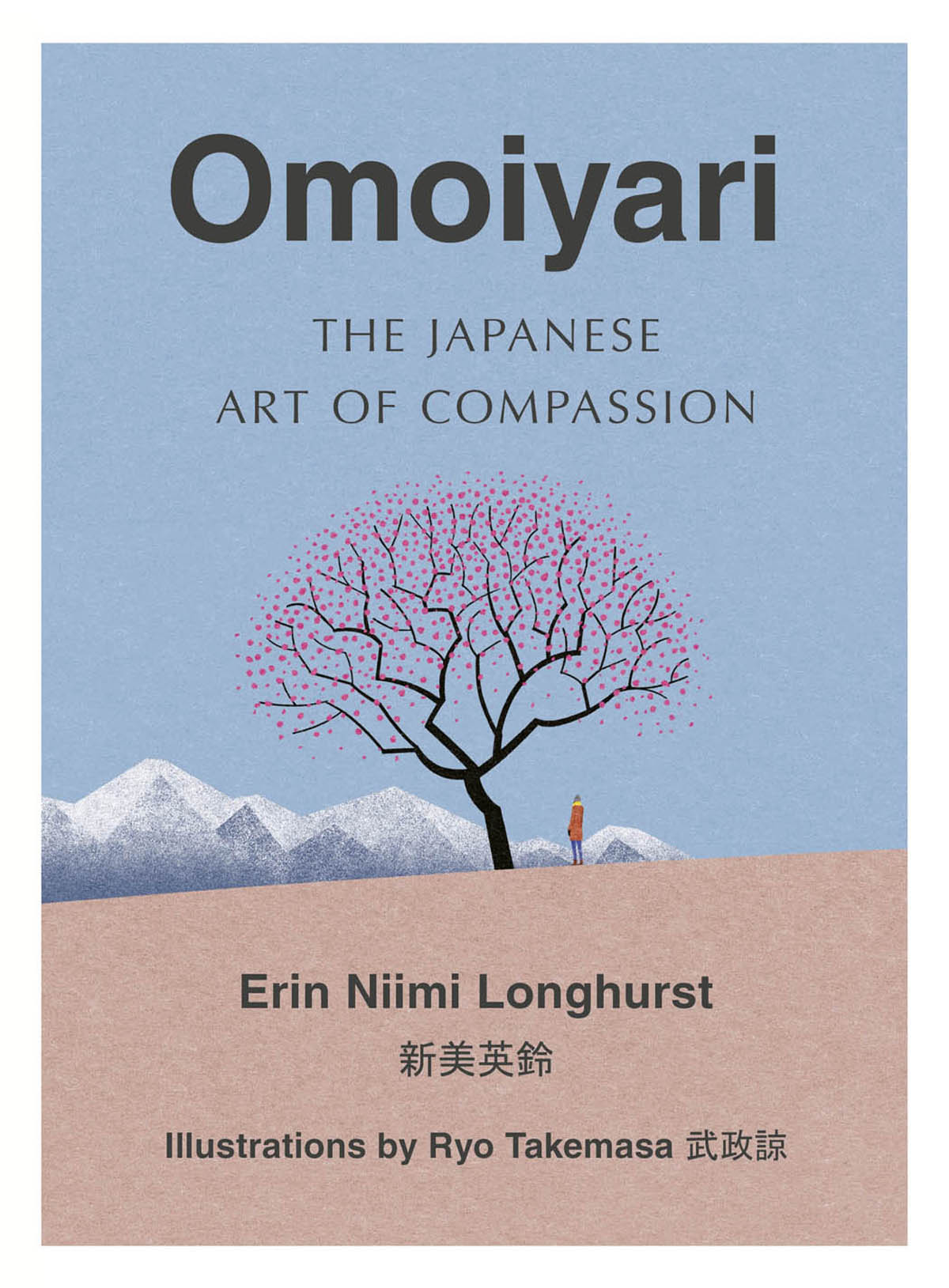
HarperCollinsPublishers
1 London Bridge Street
London SE1 9GF
www.harpercollins.co.uk
First published by HarperCollinsPublishers 2020
FIRST EDITION
Erin Niimi Longhurst 2020
Cover layout design HarperCollinsPublishers Ltd 2020
Cover illustrations Ryo Takemasa
Internal illustrations Ryo Takemasa
The author(s) and publishers cannot be held responsible for any errors and omissions that may be found in the text, or any actions that may be taken by a reader as a result of any reliance on the information contained in the text which is taken entirely at the readers own risk.
While every effort has been made to trace the owners of copyright material reproduced herein and secure permissions, the publishers would like to apologise for any omissions and will be pleased to incorporate missing acknowledgements in any future edition of this book.
A catalogue record of this book is available from the British Library
Erin Niimi Longhurst asserts the moral right to be identified as the author of this work
All rights reserved under International and Pan-American Copyright Conventions. By payment of the required fees, you have been granted the nonexclusive, non-transferable right to access and read the text of this e-book on screen. No part of this text may be reproduced, transmitted, downloaded, decompiled, reverse engineered, or stored in or introduced into any information storage retrieval system, in any form or by any means, whether electronic or mechanical, now known or hereinafter invented, without the express written permission of HarperCollins e-books.
Find out about HarperCollins and the environment at www.harpercollins.co.uk/green
Source ISBN: 9780008407629
Ebook Edition July 2020 ISBN: 9780008407636
Version 2020-07-02
This ebook contains the following accessibility features which, if supported by your device, can be accessed via your ereader/accessibility settings:
Change of font size and line height
Change of background and font colours
Change of font
Change justification
Text to speech
Page numbers taken from the following print edition: ISBN 9780008407629
Contents


Robert McConkey
During the 2018 World Cup, after a surprise victory against Colombia, Japanese football fans dominated headlines for reasons other than their countrys stellar performance on the pitch: following a historic win (and an excellent excuse to celebrate, if ever there was one), they meticulously cleared up the stadium, collecting litter as a sign of respect for their surroundings as guests.
For those who have been to Japan, stories like this might seem familiar. Ive been lucky enough to hear many of them examples of the spirit of omoiyari, the feelings of empathy and compassion that fuel the actions that people take for others. Its demonstrated most clearly in the art of Japanese hospitality, but through various other practices and traditions, too.
Living as we do, in a divisive and rapidly changing world, I felt compelled to write this book, as rather than building walls and becoming too insular, I believe there is something crucial and extremely valuable in sharing perspectives, better understanding others and, in so doing, gaining a deeper understanding of ourselves. This is omoiyari.
And what better time to write about the concept of omoiyari, and caring for others and the world around us, than at the beginning of a new era? With the abdication of the Emperor Akihito on 30 April 2019, Japan entered a new imperial age, known as Reiwa period. Reiwa means beautiful harmony. The concept of wa, or harmony, is at the very heart of omoiyari. So it seems incredibly fitting to be able to explore and better understand these traditions, philosophies and practices during this time.

Robert McConkey
GOOD DONE TO OTHERS IS GOOD DONE TO ONESELF.
Japanese proverb
What is Omoiyari?
It is difficult to define omoiyari without first explaining omoi, which is a bit of a challenge in itself. There are many homophones in the Japanese language, and the meaning behind words that might sound the same (especially to those who are not native speakers) has to become clear from the context or, if written, from the kanji (the Japanese system of writing that utilises Chinese characters).
A person might be standing in front of you, straining from the weight of a box they have in their arms. They might tell you that the box is omoi and in this context, youd want to give them a hand with it, as its a heavy box. But as you might have guessed, this is not a book about heavy Japanese things.
Omoi in the context of this book, reflects the concept of thought. Omoi can refer to the way people think, or their feelings, emotions, sentiments or desires. Memories or recollections are omoide, which loosely translates to thoughts that have come out, or have left. I have a vivid childhood memory of being caught in the pantry in the middle of the night, jetlagged and elbow-deep in a bag of kappa ebisen (shrimp-flavoured crackers) by my grandfather. Rather than giving me the scolding I was bracing myself for, he took the opportunity to eschew a low-sodium diet he was on at the time (imposed by my grandmother and aunts) to join me in the feast. Breaking out the red-bean ice cream, he justified his actions by using the moment to make a good omoide with me.
Thoughts, memories and feelings can come and go. Something you have been pondering might suddenly come to you, arriving in your mind like a train pulling into its final destination (omoitsuku); and omoi can describe not only the thoughts in your mind, but also the way in which you think about things, too.
OMOIYARI IS A FORM OF SELFLESS COMPASSION.
Omoiyari is an extension of this thinking in relation to others a type of projection. It is the combination of thought and the verb to do, but it is more than just thinking about doing something for other people. The simplest way to describe it might be to anticipate the needs of others, but in an altruistic way, imbued with sympathy, empathy without the expectation of reward or anything in return. Doing something for gain, or with an ulterior motive, is perhaps the complete opposite of omoiyari as a concept. Omoiyari is a form of selfless compassion: putting yourself in the shoes of others, and from their perspective anticipating their needs acting in a way that might make them at ease, happy or comfortable. Its about heightening your awareness to the needs of those around you, and acting in a considerate way. In a Japanese restaurant, for example, youll often find hooks or other ways to stow your bags carefully, so they dont end up scuffed on the floor (or, if youre me, smelling like barbecued meat when youre out having drinks and yakiniku skewers with your mates). Not having these things wouldnt necessarily detract from your dining experience. However, being taken care of, and having someone anticipate the fact that you might not want that handbag you saved up for dragged along the floor gives you a nice feeling.
Font size:
Interval:
Bookmark:
Similar books «Omoiyari: The Japanese Art of Compassion»
Look at similar books to Omoiyari: The Japanese Art of Compassion. We have selected literature similar in name and meaning in the hope of providing readers with more options to find new, interesting, not yet read works.
Discussion, reviews of the book Omoiyari: The Japanese Art of Compassion and just readers' own opinions. Leave your comments, write what you think about the work, its meaning or the main characters. Specify what exactly you liked and what you didn't like, and why you think so.

